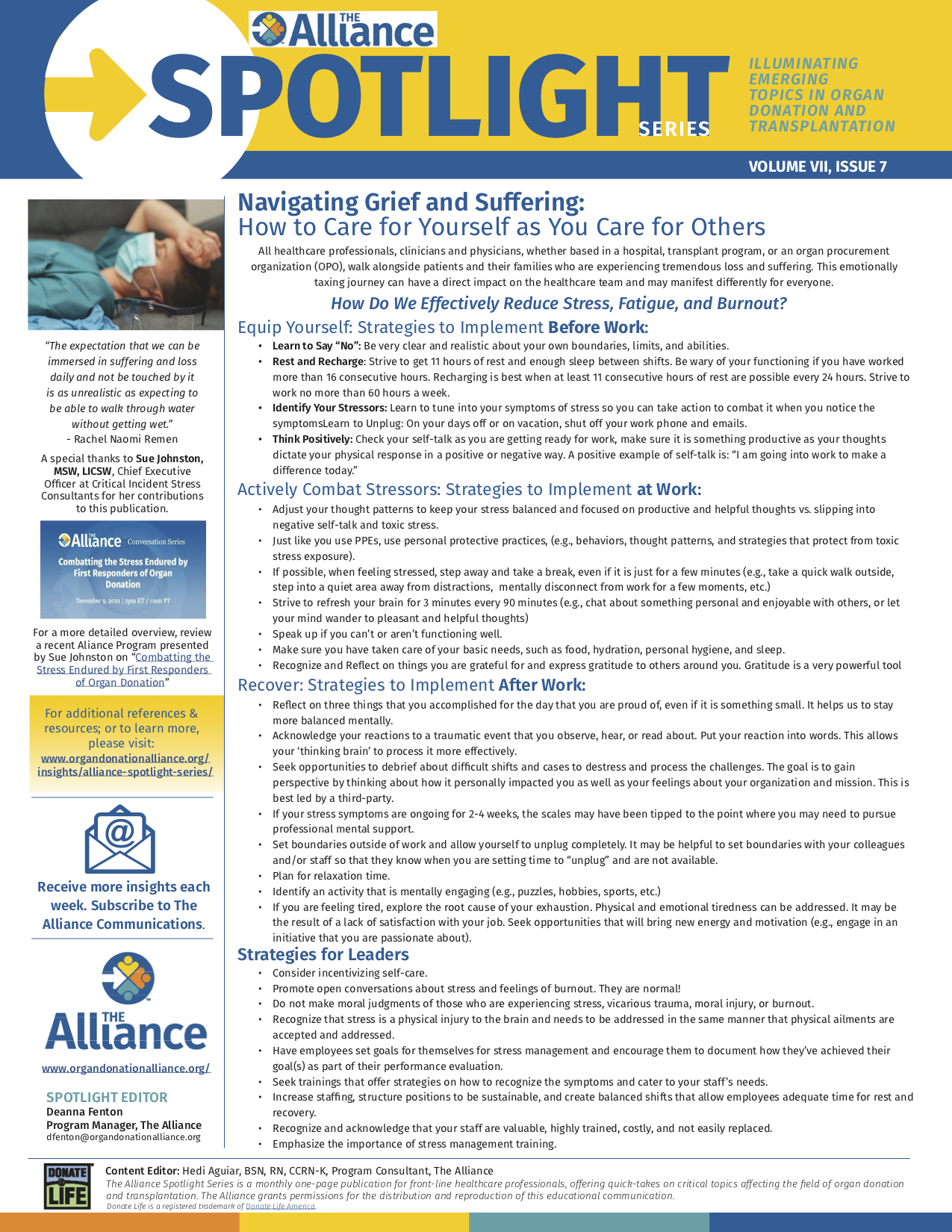“The expectation that we can be immersed in suffering and loss daily and not be touched by it is as unrealistic as expecting to be able to walk through water without getting wet.” – Rachel Naomi Remen
All healthcare professionals, clinicians and physicians, whether based in a hospital, transplant program, or an organ procurement organization (OPO), walk alongside patients and their families who are experiencing tremendous loss and suffering. This emotionally taxing journey can have a direct impact on the healthcare team and may manifest differently for everyone.
How Do We Effectively Reduce Stress, Fatigue, and Burnout?
Equip Yourself: Strategies to Implement Before Work:
- Learn to Say “No”: Be very clear and realistic about your own boundaries, limits, and abilities.
- Rest and Recharge: Strive to get 11 hours of rest and enough sleep between shifts. Be wary of your functioning if you have worked more than 16 consecutive hours. Recharging is best when at least 11 consecutive hours of rest are possible every 24 hours. Strive to work no more than 60 hours a week.
- Identify Your Stressors: Learn to tune into your symptoms of stress so you can take action to combat it when you notice the symptoms.
- Learn to Unplug: On your days off or on vacation, shut off your work phone and emails.
- Think Positively: Check your self-talk as you are getting ready for work, make sure it is something productive as your thoughts dictate your physical response in a positive or negative way. A positive example of self-talk is: “I am going into work to make a difference today.”
- Self-Care is Important: Recognize that stress is a physical injury and needs to be addressed.
Actively Combat Stressors: Strategies to Implement at work:
- Adjust your thought patterns to keep your stress balanced and focused on productive and helpful thoughts vs. slipping into negative self-talk and toxic stress.
- Just like you use PPEs, use personal protective practices, (e.g., behaviors, thought patterns, and strategies that protect from toxic stress exposure).
- If possible, when feeling stressed, step away and take a break, even if it is just for a few minutes (e.g., take a quick walk outside, step into a quiet area away from distractions, mentally disconnect from work for a few moments, etc.)
- Strive to refresh your brain for 3 minutes every 90 minutes (e.g., chat about something personal and enjoyable with others, or let your mind wander to pleasant and helpful thoughts)
- Speak up if you can’t or aren’t functioning well.
- Make sure you have taken care of your basic needs, such as food, hydration, personal hygiene, and sleep.
- Recognize and Reflect on things you are grateful for and express gratitude to others around you. Gratitude is a very powerful tool for resetting our mind.
Recover: Strategies to Implement after work:
- Reflect on three things that you accomplished for the day that you are proud of, even if it is something small. It helps us to stay more balanced mentally.
- Acknowledge your reactions to a traumatic event that you observe, hear, or read about. Put your reaction into words. This allows your ‘thinking brain’ to process it more effectively.
- Seek opportunities to debrief about difficult shifts and cases to destress and process the challenges. The goal is to gain perspective by thinking about how it personally impacted you as well as your feelings about your organization and mission. This is best led by a third-party.
- If your stress symptoms are ongoing for 2-4 weeks, the scales may have been tipped to the point where you may need to pursue professional mental support.
- Set boundaries outside of work and allow yourself to unplug completely. It may be helpful to set boundaries with your colleagues and/or staff so that they know when you are setting time to “unplug” and are not available.
- Plan for relaxation time.
- Identify an activity that is mentally engaging (e.g., puzzles, hobbies, sports, etc.)
- If you are feeling tired, explore the root cause of your exhaustion. Physical and emotional tiredness can be addressed. It may be the result of a lack of satisfaction with your job. Seek opportunities that will bring new energy and motivation (e.g., engage in an initiative that you are passionate about).
STRATEGIES For Leaders:
- Consider incentivizing self-care.
- Promote open conversations about stress and feelings of burnout. They are normal!
- Do not make moral judgments of those who are experiencing stress, vicarious trauma, moral injury, or burnout.
- Recognize that stress is a physical injury to the brain and needs to be addressed in the same manner that physical ailments are accepted and addressed.
- Have employees set goals for themselves for stress management and encourage them to document how they’ve achieved their goal(s) as part of their performance evaluation.
- Seek trainings that offer strategies on how to recognize the symptoms and cater to your staff’s needs.
- Increase staffing, structure positions to be sustainable, and create balanced shifts that allow employees adequate time for rest and recovery.
- Recognize and acknowledge that your staff are valuable, highly trained, costly, and not easily replaced.
- Emphasize the importance of stress management training.







